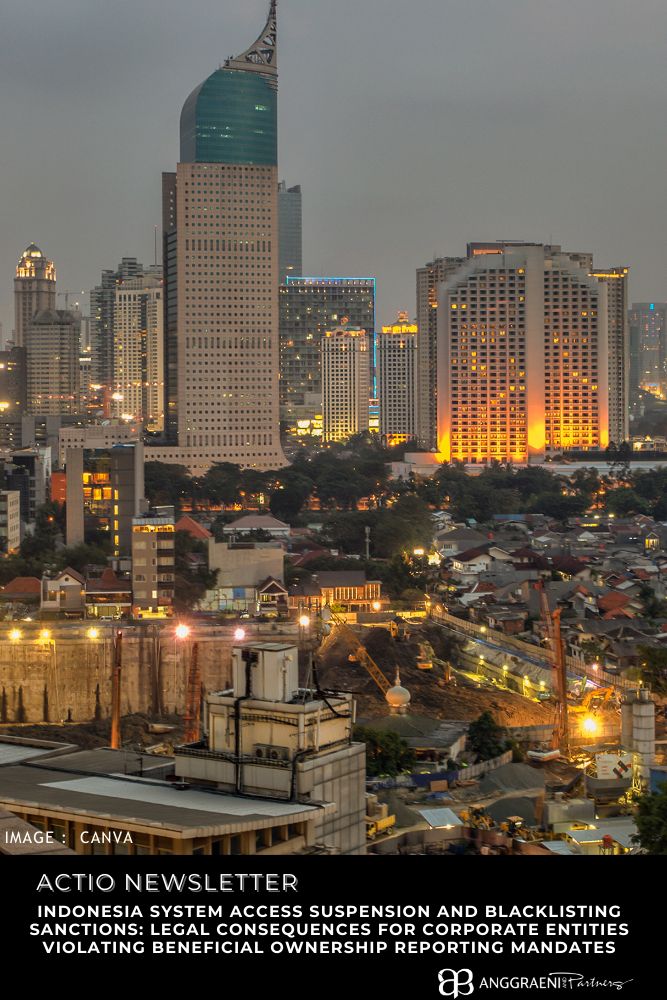Essential Financial Crime Offences Affecting Corporations and Their Leadership: An Insight into Relevant Laws and Regulations in Indonesia
by : Setyawati Fitrianggraeni, Yoga Adi Nugraha, Aga Kristiana Silaen and Nazaruddin Insyiroh
In a climate where corporate conduct is increasingly scrutinized, it’s crucial for businesses operating in Indonesia to comprehend the framework of financial crime laws affecting them. This article sheds light on major financial crime offenses—corruption, money laundering, tax evasion, and fraud—outlining the Indonesian legislation that governs these activities. Our aim is to provide a succinct overview of these laws, focusing on the implications for corporations and their leadership, thereby aiding in navigating the complexities of compliance and corporate governance within Indonesia’s legal environment.
The key financial crime offenses are regulated in various laws or regulations as set out below:
Corruption
Law Number 31 of 1999 on Eradication of the Crime of Corruption as amended by Law Number 20 of 2001 and partially revoked with Law Number 1 of 2023 on Criminal Code is the primary legislation in Indonesia dealing with corruption, bribery, conflict of interests, and gratification. Prosecution and criminal imposition may be carried out against the corporation and or its management in the event that a criminal act of corruption is committed by or on behalf of a corporation as stipulated in Article 20 Paragraph (1).
Money Laundering
Law Number 8 of 2010 on the Prevention and Eradication of Money Laundering Crime sets out offences related to money laundering. According to Article 6 Paragraph (1), “In the event that the crime of money laundering as referred to in Article 3, Article 4, and Article 5 is committed by a corporation, the sentence shall be imposed on the corporation and/or the personnel controlling the corporation”.
Tax Evasion
Law Number 28 of 2007 on Third Amendment to Law Number 6 of 1983 on General Provisions and Procedures of Tax as amended by Law Number 16 of 2009. One example of tax evasion that is often found is taxpayers who do not report part or all of their income in their annual tax return, charge expenses that should not be used as a deduction in income with the aim of minimising the tax burden, as well as increasing costs in a fictitious way.
Fraud
Law Number 5 of 1999 on Prohibition of Monopolistic Practices and Unfair Business Competition as amended by Government Regulation in Lieu of Law Number 2 of 2022 concerning Job Creation and as stipulated by Law Number 6 of 2023 concerning Stipulation of Government Regulation in Liew of Law Number 2 of 2022 concerning Job Creation to be Enacted as Law (“Job Creation Law”) is the primary legislation in Indonesia dealing with monopoly, price fixing, cartel, dominant position and other unfair business competition practices. The criminal sanctions regulated in Article 48 of this law may be imposed on business actors including individuals or entities.
DISCLAIMER:
This disclaimer applies to the publication of articles by Anggraeni and Partners. By accessing or reading any articles published by Anggraeni and Partners, you acknowledge and agree to the terms of this disclaimer:
No Legal Advice: The articles published by Anggraeni and Partners are for informational purposes only and do not constitute legal advice. The information provided in the articles is not intended to create an attorney-client relationship between Anggraeni and Partners and the reader. The articles should not be relied upon as a substitute for seeking professional legal advice. For specific legal advice tailored to your individual circumstances, please consult a qualified attorney.
Accuracy and Completeness: Anggraeni and Partners strive to ensure the accuracy and completeness of the information presented in the articles. However, we do not warrant or guarantee the accuracy, currency, or completeness of the information. Laws and legal interpretations may vary, and the information in the articles may not be applicable to your jurisdiction or specific situation. Therefore, Anggraeni and Partners disclaim any liability for any errors or omissions in the articles.
No Endorsement: Any references or mentions of third-party organizations, products, services, or websites in the articles are for informational purposes only and do not constitute an endorsement or recommendation by Anggraeni and Partners. We do not assume responsibility for the accuracy, quality, or reliability of any third-party information or services mentioned in the articles.
No Liability: Anggraeni and Partners, its partners, attorneys, employees, or affiliates shall not be liable for any direct, indirect, incidental, consequential, or special damages arising out of or in connection with the use of the articles or reliance on any information contained therein. This includes but is not limited to, loss of data, loss of profits, or damages resulting from the use or inability to use the articles.
No Attorney-Client Relationship: Reading or accessing the articles does not establish an attorney-client relationship between Anggraeni and Partners and the reader. The information provided in the articles is general in nature and may not be applicable to your specific legal situation. Any communication with Anggraeni and Partners through the articles or any contact form on the website does not create an attorney-client relationship or establish confidentiality.
By accessing or reading the articles, you acknowledge that you have read, understood, and agreed to this disclaimer. If you do not agree with any part of this disclaimer, please refrain from accessing or reading the articles published by Anggraeni and Partners.
For further information, please contact:
P: 6221. 7278 7678, 72795001
H: +62 811 8800 427
S.F. Anggraeni
Managing Partner
Yoga Adi Nugraha
Managing Associate Practice Group White Collar Crime and Investigation
Aga Kristiana Silaen
Middle Associate
Nazaruddin Insyiroh
Trainee Associate



